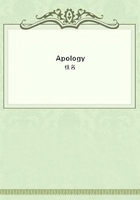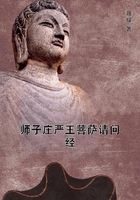Profound silence reigned in the small room; books were to be seen everywhere on the shelves, on the tables, and on the floor; they formed almost the only decoration of this room which contained only the most indispensable furniture.
It was the room of a German SAVANT, a professor at the far-famed University of Jena.
He was sitting at the large oaken table where he was engaged in writing. His form, which was of middle height, was wrapped in a comfortable dressing-gown of green silk, trimmed with black fur, which showed here and there a few worn-out, defective spots. A small green velvet cap, the shape of which reminded the beholder of the cap of the learned Melancthon, covered his expansive, intellectual forehead, which was shaded by sparse light-brown hair.
A number of closely-written sheets of paper lay on the table before him, on which the eyes of the SAVANT, of the philosopher, were fixed.
This SAVANT in the lonely small room, this philosopher was George Frederick William Hegel.
For two days he had not left his room; for two days nobody had been permitted to enter it except the old waitress who silently and softly laid the cloth on his table, and placed on it the meals she had brought for him from a neighboring restaurant.
Averting his thoughts from all worldly affairs, the philosopher had worked and reflected, and heard nothing but the intellectual voices that spoke to him from the depths of his mind. Without, history had walked across the battle-field with mighty strides and performed immortal deeds; and here, in the philosopher's room, the mind had unveiled its grand ideas and problems.
On the 14th of October, and in the night of the 14th and 15th, Hegel finished his "Phenomenology of the Mind," a work by which he intended to prepare the world for his bold philosophical system, and in which, with the ringing steps of a prophet, he had accomplished his first walk through the catacombs of the creative intellect.
All the power and strength of reality, in his eyes, sprang from this system, which he strove to found in the sweat of his intellectual brow,--and his system had caused him to forget the great events that had occurred in his immediate neighborhood.
Now he had finished his work; now he had written the last word. The pen dropped from his hands, which he folded over his manuscript as if to bless it silently.
He raised his head, which, up to this time, he had bent over the paper, and his blue eyes, so gentle and lustrous, turned toward heaven with a silent prayer for the success of his work. His fine, intellectual face beamed with energy and determination; the philosopher was conscious of the struggle to which his work would give rise in the realm of thought, but he felt ready and prepared to meet his assailants.
"The work is furnished," he exclaimed, loudly and joyfully; "it shall now go out into the world!"
He hastily folded up his manuscript, wrapped a sheet of paper around it, sealed it and directed it.
Then he looked at his watch.
"Eight o'clock," he said, in a low voice; "if I make haste, the postmaster will forward my manuscript to-day."
He divested himself of his gown, and dressed. Then he took his hat and the manuscript and hastened down into the street toward the post-office. Absorbed as he was in his reflections, he saw neither the extraordinary commotion reigning in the small university town, nor the sad faces of the passers-by; he only thought of his work, and not of reality.
He now entered the post-office; all the doors were open; all the employes were chatting with each other, and no one was at the desk to attend to the office business and to receive the various letters.
Hegel, therefore, had to go to the postmaster, who had not noticed him at all, but was conversing loudly and angrily with several gentlemen who were present.
"Here is a package which I want you to send to Hamburg," said the philosopher, handing his package to the postmaster. "The stage-coach has not set out yet, I suppose?"
The postmaster stared at him wonderingly. "No," he said, "it has not set out yet, and will not set out at all!"
It was now the philosopher's turn to look wonderingly at the postmaster.
"It will not set out?" he asked. "Why not?"
"It is impossible, in the general confusion and excitement. There are neither horses nor men to be had to-day. Everybody is anxious and terrified."















